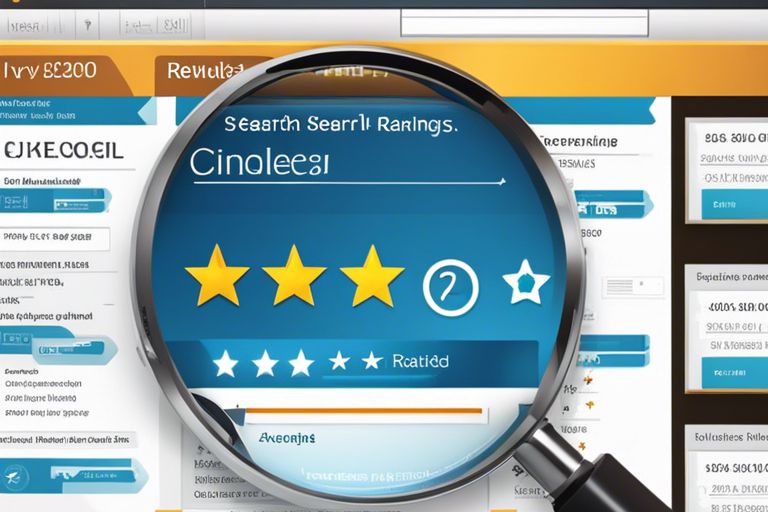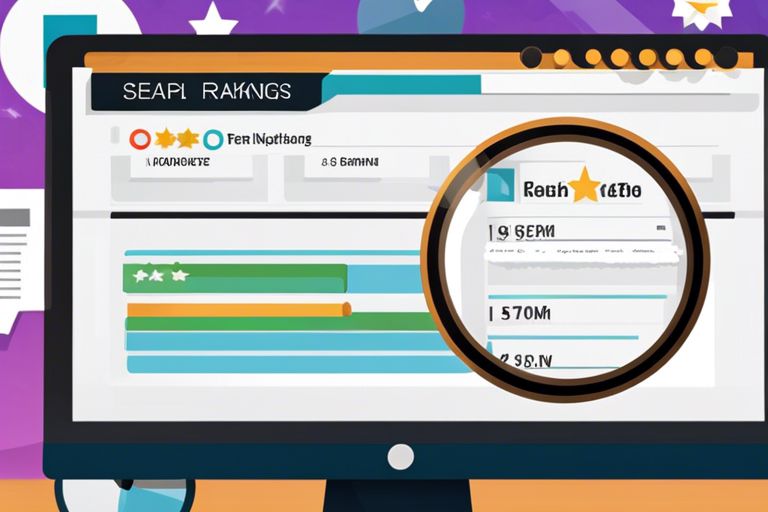In the competitive landscape of online businesses, star ratings play a crucial role in determining the search engine rankings of websites. Search engines like Google consider user feedback and ratings to assess the credibility and relevance of a website, impacting its visibility to potential customers. Websites with high star ratings are more likely to rank higher in search results, attracting more organic traffic and ultimately leading to increased sales and conversions. On the other hand, poor ratings can significantly harm a website’s visibility and reputation, potentially deterring customers and impacting its overall success. Understanding how star ratings influence search engine rankings is crucial for businesses looking to improve their online presence and stay ahead of the competition.
Key Takeaways:
- Star ratings impact search engine rankings: High star ratings can boost a website’s visibility on search engines like Google.
- Consumer trust is crucial: Positive reviews and high star ratings can increase consumer trust in a website, leading to more traffic and conversions.
- Quality content and user experience matter: Encouraging positive reviews through excellent content and user experience can help improve star ratings and ultimately influence search engine rankings.
The Science Behind Star Ratings
In the digital age, star ratings play a crucial role in influencing search engine rankings. Search engines consider star ratings as a strong signal of credibility and quality, impacting the visibility and click-through rates of websites. Understanding the science behind star ratings is crucial for businesses looking to improve their online presence and attract more customers.
Understanding the Star Rating System
The star rating system is a widely recognised method for users to express their opinions and evaluate products or services. Ratings typically range from one to five stars, with five stars indicating exceptional quality and one star representing poor performance. Search engines like Google use these ratings to determine the relevance and reliability of a website, influencing its position in search results. For businesses, maintaining a high star rating is not just about vanity, but also about improving their online reputation and attracting more organic traffic.
Research has shown that consumers heavily rely on star ratings when making purchasing decisions online. A high star rating can significantly increase the likelihood of a user clicking on a website and choosing its products or services over competitors with lower ratings. It’s crucial for businesses to understand the psychology behind user perception and trust to leverage the power of star ratings effectively.
The Psychology of User Perception and Trust
The psychology of user perception and trust plays a pivotal role in how individuals interpret star ratings. Users tend to associate higher star ratings with better quality, credibility, and trustworthiness. Seeing a high average star rating can instil confidence in potential customers and influence their decision-making process. On the other hand, a low star rating can raise red flags and deter users from engaging with a website or business.
Star Ratings and Search Engine Algorithms
With respect to search engine rankings, star ratings play a crucial role in determining the visibility and credibility of a website. Search engines like Google use complex algorithms to analyse various factors, including user reviews and ratings, to determine the quality and relevance of a website’s content.
How Search Engines Incorporate User Reviews
Search engines incorporate user reviews by crawling and indexing them to understand the sentiment and credibility of a website. They look at the overall rating, the quantity of reviews, and the frequency of new reviews to determine the trustworthiness and authority of the website.
Furthermore, search engines also consider the keywords used in the reviews to understand the context and relevance of the content in relation to user queries. This helps search engines provide more accurate and valuable results to users based on the quality of reviews.
The Impact of Star Ratings on SEO
Star ratings have a significant impact on SEO (Search Engine Optimisation) as they directly influence how websites are ranked in search results. Websites with higher star ratings are more likely to appear at the top of search results, increasing visibility and attracting more organic traffic.
Having positive star ratings can also enhance the credibility and trustworthiness of a website, leading to higher click-through rates and ultimately improving the overall SEO performance of the site.
Star ratings should not be underestimated in the world of SEO, as they can make or break a website’s online presence. Websites with low or no star ratings may struggle to compete with those that have high ratings, as users are more likely to click on websites with positive reviews and ratings.
Improving Star Ratings and Managing Online Reputation
In the digital age, online reputation holds a significant weight in influencing consumer decisions and search engine rankings. It is crucial for businesses to actively work on improving their star ratings to attract more customers and enhance their online credibility. A key aspect of this process involves implementing strategies to increase positive reviews and effectively managing negative feedback.
Strategies to Increase Positive Reviews
One effective strategy to increase positive reviews is to encourage satisfied customers to leave feedback by sending follow-up emails or providing incentives such as discounts or rewards. Engaging with customers on social media platforms and promptly responding to their reviews can also encourage them to share their positive experiences. Additionally, businesses can optimise their website to make it easier for customers to leave reviews and ratings, ultimately boosting their star ratings.
Addressing Negative Feedback and Its Effects
Despite best efforts, negative feedback is almost inevitable for any business. It is crucial to address negative reviews promptly and professionally. Businesses should respond publicly to negative feedback, showing empathy and a willingness to resolve any issues. By addressing negative feedback effectively, businesses can demonstrate their commitment to customer satisfaction and potentially turn a negative experience into a positive one.
Ignoring negative feedback or responding defensively can have detrimental effects on a business’s online reputation. Unresolved negative feedback can deter potential customers and impact search engine rankings. By actively addressing and resolving negative feedback, businesses can not only improve their reputation but also build trust and loyalty with their customer base.
Measuring the Effects of Star Ratings on Traffic and Conversion
Star ratings play a crucial role in influencing search engine rankings, which in turn impact website traffic and conversion rates. Understanding the effects of star ratings on these key metrics is crucial for businesses looking to improve their online visibility and performance.
Tools and Metrics for Analyzing Ratings Impact
There are various tools and metrics available to help businesses analyse the impact of star ratings on their online presence. Tools such as Google Analytics can provide insights into how star ratings affect website traffic, bounce rates, and conversion rates. Metrics like click-through rates (CTRs) and conversion tracking can also help businesses understand the direct correlation between star ratings and user behaviour.
Additionally, sentiment analysis tools can be used to gauge the overall sentiment of reviews and comments related to star ratings. These tools can highlight positive or negative trends in customer feedback, which can be valuable in identifying areas for improvement and capitalising on strengths to enhance search engine rankings.
Case Examples of Improved Rankings through Star Ratings
Many businesses have experienced significant improvements in their search engine rankings by leveraging star ratings effectively. By actively collecting and displaying positive customer reviews, businesses have seen a noticeable increase in organic search visibility and click-through rates. This has resulted in higher website traffic and improved conversion rates, ultimately leading to a boost in online revenue.
In one case study, a small e-commerce store saw a 30% increase in organic traffic after implementing a review system that showcased star ratings prominently on their product pages. This simple yet powerful strategy not only enhanced the store’s credibility and trustworthiness in the eyes of consumers but also had a direct impact on their search engine rankings, propelling them ahead of competitors in their niche.
Conclusion: How Star Ratings Influence Search Engine Rankings
In the aggregate, star ratings play a significant role in influencing search engine rankings. The presence of positive reviews and high star ratings can enhance a website’s visibility and credibility, leading to better search engine rankings. Users tend to trust businesses with higher star ratings, resulting in increased click-through rates and improved organic traffic. It is crucial for businesses to actively manage their online reputation by soliciting feedback, resolving issues, and encouraging satisfied customers to leave positive reviews. By prioritising the collection of star ratings and reviews, businesses can boost their search engine rankings and ultimately attract more customers.
FAQ
Q: How do star ratings influence search engine rankings?
A: Star ratings influence search engine rankings by providing social proof of a website’s trustworthiness and credibility. Search engines like Google take into account user ratings and reviews to determine a website’s quality and relevance to specific search queries.
Q: Do star ratings impact click-through rates on search results?
A: Yes, star ratings can significantly impact click-through rates on search results. Websites with higher star ratings tend to attract more clicks from users as they stand out and indicate a higher level of satisfaction among previous customers.
Q: How can businesses improve their star ratings to boost search engine rankings?
A: Businesses can improve their star ratings by providing excellent products or services, encouraging customers to leave feedback, promptly addressing negative reviews, and actively engaging with their audience to build a positive online reputation.
Q: What role do schema markups play in displaying star ratings on search results?
A: Schema markups play a crucial role in displaying star ratings on search results. By implementing structured data markup on their websites, businesses can signal to search engines the specific content elements, such as star ratings, to display in search results, increasing visibility and credibility.
Q: Are fake or incentivised reviews a viable strategy to improve star ratings for search engine rankings?
A: No, fake or incentivised reviews are not a viable strategy to improve star ratings for search engine rankings. Search engines have algorithms in place to detect fraudulent activities, and businesses found engaging in such practices may face penalties such as lower rankings or even removal from search results.




